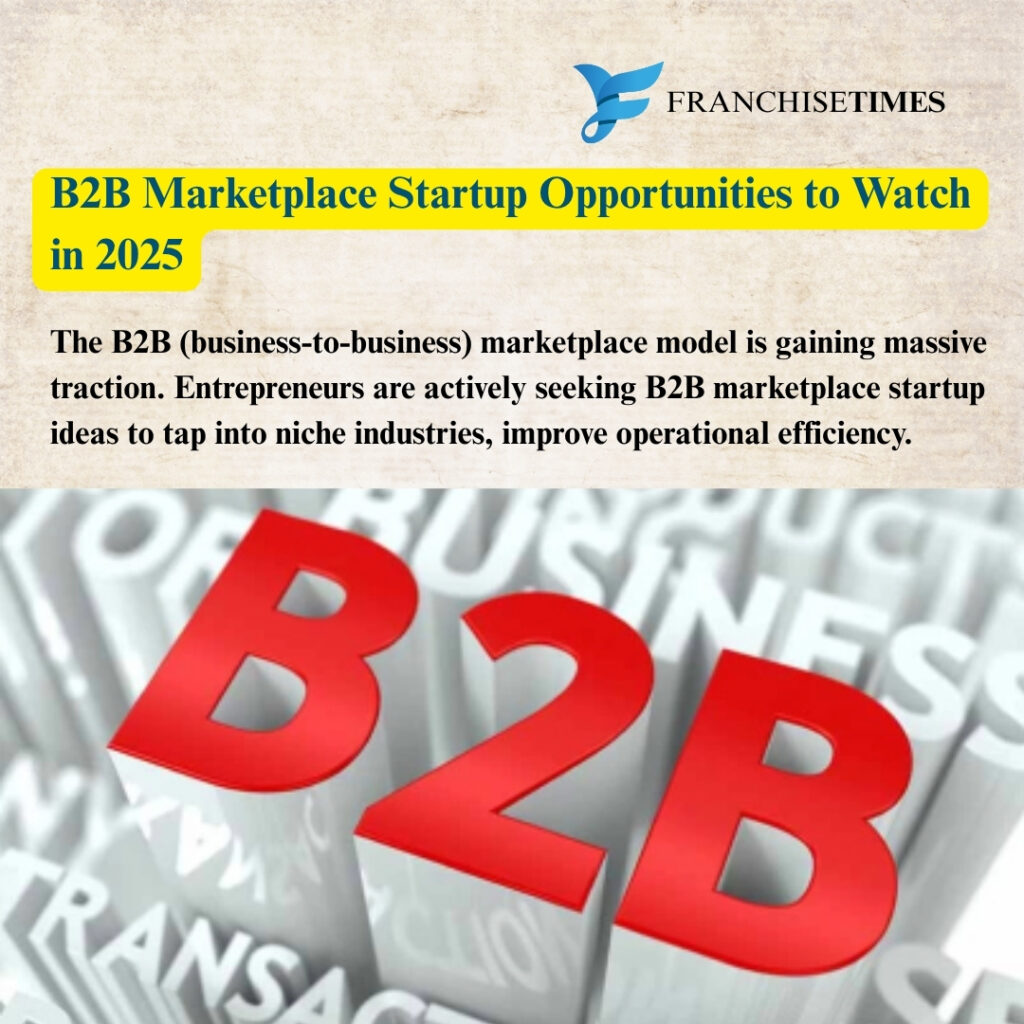B2B Marketplace Startup Opportunities to Watch in 2025
In today’s digital-first world, the B2B (business-to-business) marketplace model is gaining massive traction. Entrepreneurs are actively seeking B2B marketplace startup opportunities to tap into niche industries, improve operational efficiency, and unlock scalable growth. If you’re one of them, you’ve come to the right place.

Unlike B2C platforms, B2B marketplaces focus on helping businesses transact with other businesses. This dynamic model creates opportunities to solve real industry problems through digitization, automation, and smart matchmaking. In this blog post, we’ll explore some of the most promising B2B marketplace startup ideas that can inspire your next big venture.
1. Niche Raw Material Marketplaces
Every manufacturing industry depends on reliable raw material suppliers. Yet, many still rely on outdated procurement channels involving phone calls, paperwork, and middlemen. This opens up a huge opportunity for a B2B marketplace startup that targets niche raw material verticals.
For instance, consider a digital marketplace for sourcing sustainable textiles, rare earth metals, or even construction-grade bamboo. By focusing on a specific segment, your platform can offer curated vendor lists, real-time inventory updates, and seamless logistics integration.
Moreover, you can provide tools like RFQ (Request for Quotation), comparative bidding, and quality assurance to help businesses make informed decisions. Transitioning suppliers and buyers into a transparent and tech-enabled ecosystem significantly reduces costs and speeds up the procurement process.
2. B2B marketplace startup opportunities for Industrial Equipment Rentals
Buying heavy machinery is expensive, and maintenance can be a hassle. That’s why businesses often prefer renting equipment for short-term projects. Still, this process is often informal and lacks transparency. Here’s where a B2B marketplace startup for industrial equipment rentals can thrive.
Think of it as an “Airbnb for bulldozers” or “Uber for forklifts.” Your platform could connect construction firms, mining companies, and logistics providers with equipment owners who want to monetize idle assets. Features like real-time availability, pricing calculators, delivery tracking, and digital contracts make this model scalable.
You can also introduce premium add-ons such as insurance, maintenance support, and operator services. As more industries look to cut capital expenditure, equipment-sharing models are gaining popularity.
3. Wholesale B2B Platforms for Eco-Friendly Products
Sustainability is no longer optional—it’s a global movement. Businesses are under increasing pressure to meet ESG (Environmental, Social, and Governance) standards. That’s why building a B2B marketplace startup focused on eco-friendly products is a smart and timely idea.
Your platform can serve as a bridge between eco-product manufacturers (think compostable packaging, recycled office supplies, green cleaning chemicals) and businesses across industries. By offering detailed product specs, certifications, and carbon footprint data, your marketplace becomes a one-stop shop for sustainable procurement.
In addition, you can provide subscription plans, bulk discounts, and impact tracking tools to help businesses showcase their green commitments to stakeholders.
4. Talent-as-a-Service Marketplaces for Skilled Professionals
Hiring the right talent is one of the biggest challenges for businesses today. Traditional hiring models are often slow and expensive. This has given rise to the idea of Talent-as-a-Service (TaaS) platforms—another innovative spin on B2B marketplace startup ideas.
Imagine a platform where companies can instantly hire vetted professionals for short-term projects, recurring gigs, or even interim executive roles. Your marketplace could specialize in tech, legal, marketing, or financial consulting. Unlike freelancing sites, a TaaS B2B marketplace is more curated, contract-driven, and business-centric.
You can add value by verifying credentials, managing compliance, automating contracts, and offering embedded payment solutions. Additionally, using AI for talent matching and skill assessment can further streamline the process.
5. Cross-Border Trade Marketplaces
International trade remains complex, especially for small and medium-sized enterprises (SMEs). They struggle with customs regulations, compliance, payment security, and trusted suppliers. A B2B marketplace startup that simplifies cross-border trade could become a game-changer.
Your platform can focus on a particular trade corridor—for example, exporting Indian handicrafts to the EU or sourcing electronics from Southeast Asia. Features like multilingual catalogs, escrow payments, compliance automation, and integrated logistics will build trust and usability.
Moreover, partnerships with trade finance providers and customs brokers can offer end-to-end solutions for buyers and sellers. With the global shift toward digital trade facilitation, this model addresses a critical need.
Bonus: Governments around the world are offering incentives and support for export-enabling platforms. Tapping into such programs can reduce your go-to-market cost.
Turning Your Idea into a Scalable Business
Once you’ve chosen a promising B2B marketplace startup opportunities idea, the next step is execution. Start by building a minimum viable product (MVP) that solves one core problem for your target users. Whether it’s simplifying vendor discovery, digitizing transactions, or enabling faster fulfillment, your MVP should focus on delivering immediate value. From there, gather feedback, iterate quickly, and refine your platform based on actual user behavior. Don’t forget to invest in robust backend infrastructure, intuitive UI/UX, and a clear onboarding process to ensure adoption and retention.
Don’t Just Follow Trends—B2B marketplace opportunities
While the ideas in this article are trending, the most successful startups don’t chase trends—they solve pressing problems with a fresh perspective. Spend time talking to your target audience, understanding their workflows, and identifying friction points. The more closely your platform aligns with their daily challenges, the more indispensable it becomes. With the rise of digitization across industries, now is the perfect moment to build something meaningful. Let your B2B marketplace startup idea be the solution that drives smarter, faster, and more efficient business transactions.
Final Thoughts
Building a successful B2B marketplace startup opportunities requires more than just a good idea—it demands industry insights, strong technology, and relentless execution. The five B2B marketplace startup ideas we discussed above all solve real pain points and offer room for innovation.
To summarize:
- Niche raw material platforms help streamline procurement.
- Equipment rental marketplaces optimize underused assets.
- Eco-product B2B sites ride the sustainability wave.
- Talent-as-a-Service models match skills with needs.
- Cross-border trade hubs simplify global sourcing.
As you consider which path to pursue, focus on one problem, validate it deeply, and build trust with early adopters. Once your platform delivers consistent value, network effects will kick in—and your startup could become the next big name in B2B commerce.
